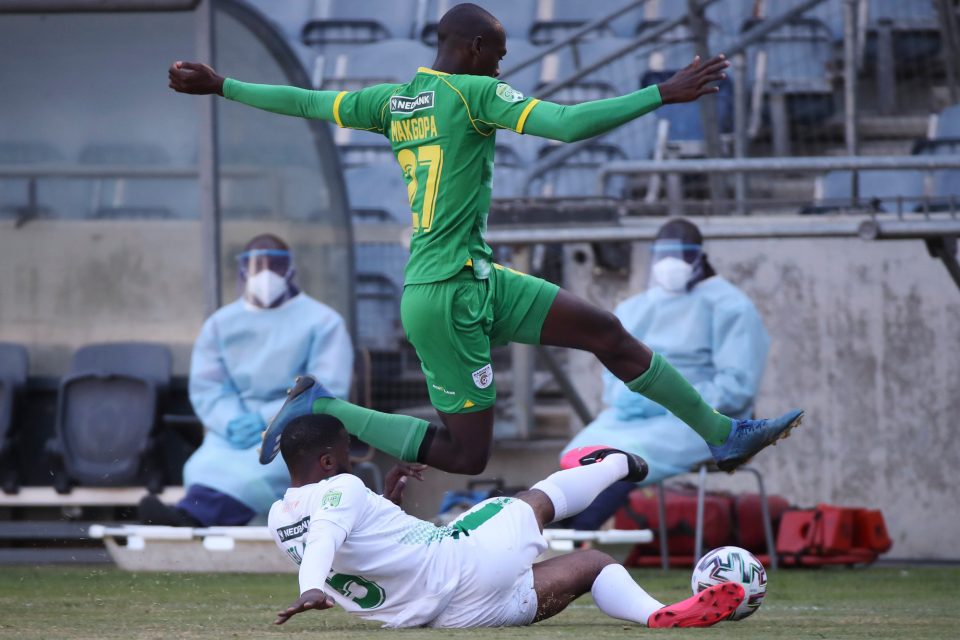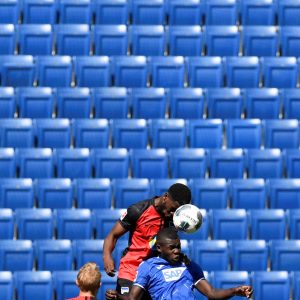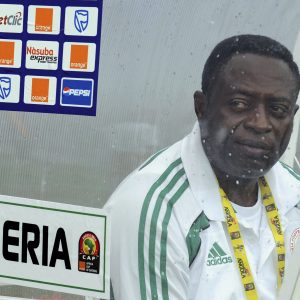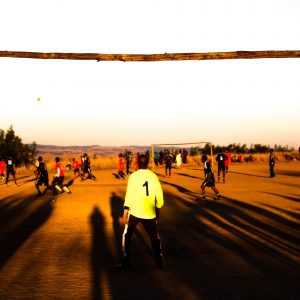SA football’s return a strange yet familiar sight
Highlands Park fitness trainer Simone Conley says injuries will occur ‘without a doubt’ as footballers play a high number of games in a short space of time following inactivity since March.
Author:
11 August 2020

The strangeness of it all was eerily familiar. The masks, sanitising stations, a stadium with no supporters and reserves dotted at a social distance around the stand instead of sitting shoulder-to-shoulder in the technical area have become a familiar sight in football matches owing to the Covid-19 pandemic.
This is how South African football looked, too, when it returned on 8 August at Soweto’s Orlando Stadium in a Nedbank Cup semifinal double header. Bloemfontein Celtic and Mamelodi Sundowns scored three goals each en route to booking their places in the final of the country’s premier cup competition, at the expense of Baroka FC and Bidvest Wits.
The flood of goals – eight in two games – was accompanied by sloppy defending, players cramping and some pulling muscles in the first professional football matches in South Africa in almost 150 days devoid of the beautiful game. “Without a doubt, [muscle injuries] will continue happening,” says Highlands Park fitness trainer Simone Conley in a matter-of-fact tone.
Related article:
“This is a normal response from the body. There is fitness, football fitness and match fitness. The players are fit, but they aren’t match fit. The match situation has certain demands that you cannot prepare for without playing a match. We couldn’t play friendlies due to the lockdown, and it will show,” says Conley.
“When you are playing a competitive match, you are anxious and your heart rate increases. That puts a lot of demand on your body and you burn out faster. There is no way anyone is 100% fit at this level, so expect cramps, niggles and injuries.”

The challenge for fitness trainers
Conley and the other fitness trainers will have their work cut out for them in the final stretch of the Absa Premiership, which runs from 11 August to 5 September after months of inactivity. The promotion and relegation playoffs end on 21 September, giving the players a short break before the 2020-2021 season starts on 9 October.
What will make the trainers’ jobs tougher this season is that players have exercised predominantly on their own in lockdown since football’s abrupt halt in March, yet they now have to play a number of crucial games in a short space of time. The team with the most games remaining in their season will play nine matches while those with the least games, including Highlands, have six fixtures left to contest.
“The biggest challenge will be the players’ mental state,” says Conley. “The players are drained. This is an extended season and they haven’t really rested. They have been training since lockdown started in March and their brains have been constantly switched on. A number of them haven’t spent time with their families. And we already have to start planning for the next season.
Related article:
“What I have done with my team is to work on maintaining their fitness. They are already fit, so we didn’t look at making them even fitter. What was challenging is the uncertainty, not knowing when the league would start because that messed with our periodisation and finding the balance between training and resting,” she says.
“What was challenging during the lockdown was that we couldn’t do football-specific training like running, sprinting, agility and on-the-ball stuff. We have been mostly training in small groups. We have our first game on Friday [14 August], yet our first training session as a group was on Monday [10 August].”
To help ease the load on players, football world governing body Fifa has allowed teams to make five player changes instead of three during matches. Their benches will also have two more players, taking their options for substitutes to nine. But those five substitutions can only be done on three occasions, excluding during halftime. “The people who’ve got the best squads have the better chance with the five substitutes,” says Wits coach Gavin Hunt. “They can almost go like-for-like with their changes.”
Adapting to the new normal
Sundowns boast one of the best squads in the country. But coach Pitso Mosimane had some challenges implementing five substitutions in their 3-2 win over the Clever Boys. “We now know how football looks in this period,” Mosimane says. “If you haven’t played [in this setup], you can’t talk. If you haven’t suffered a muscle injury, like we did with [Sphelele] Mkhulise unable to finish the game and Rivaldo [Coetzee] on the edge, you don’t understand.
“You can say that we have a little bit of an advantage because we now know this situation a bit better. I don’t know how many times I asked the referee, do I still have a substitution to make? They said, ‘Yes, you do. You still have two more.’ It’s a bit confusing, that you can make five substitutions on three occasions and the ones you make at halftime don’t count as a used period. You might know the rules, but once you are stressed and under pressure, things go out of your mind. That’s football under Covid-19, it’s going to be tough.”
Related article:
The other challenge is that players will be basically in camp until the end of the season. One of the safety measures to ensure the safe return of football was placing all 32 clubs in a safe environment in Gauteng, ironically the epicentre of the Covid-19 pandemic at present. But the province boasts the kind of infrastructure and number of stadiums that only one other province, KwaZulu-Natal, can match. The players – along with the support staff, as teams are only allowed 50 people in what the Premier Soccer League (PSL) is calling a bio-safe environment (BSE) – will only leave the bubble at the end of the season.
The cabin fever that will undoubtedly ensue will require mental toughness as players essentially go from one lockdown to another. They will only leave the hotel to go to training and games. It will be a tough mental exercise to maintain focus with so much change to how they do their job.
“The greater human resource work rests with the club,” PSL chairperson Irvin Khoza said. “The plan is strict and costly, it is costly monetarily and the vigilance it requires. The integrity of the bubble can be compromised by one irresponsible or ignorant person. It is part of the plan to repair the cracks that will occur as we implement [this plan].”

Protecting the integrity of the bubble
The PSL has done more than most employers in the country to ensure that their workers return safely to their jobs, and that they are safe during this process. Two tests, with the second done 48 hours before teams entered the BSE, were conducted to ensure that no Covid-19-positive person entered the bubble.
But where the league dropped the ball was in allowing teams to enter the bubble just hours before their games. Celtic arrived in the BSE on Friday, a day before they took on Bakgaga at 2pm. In an ideal world, clubs should have spent some time in isolation and then gone directly into the BSE after that. There were suggestions that this would have been the case with the PSL, but when questioned why players didn’t self-isolate before they entered the bubble in a Covid-19 hotspot, Khoza went on the defensive.
“Let’s talk about the concerns [of playing in a Covid-19 hotspot],” said Khoza. “I am saying, and I keep on saying, these are people who are going to work. Like any South African, including yourself, you have gone to work, under difficult conditions for that matter. Either by taxi, bus or train. No one of you has gone for any pretesting. Only football has done pretesting to mitigate the risks.
“We have done everything possible, unlike many other industries like mining that just opened, and they just went to work … We are doing that in cognisance of the environment around us because as we know now, there isn’t a part of the country that isn’t a hotspot. Every part of the country is a hotspot. It means let’s shut down the economy and we all stay at home. How are we going to rehabilitate that economy? It is a balancing act, how we balance saving lives and livelihoods.”
Related article:
The bubble is a financially straining exercise, which is why Khoza was reluctant to commit to whether or not the new season would also start in the BSE with Covid-19 numbers still on an upward trajectory. It’s not just the teams’ pockets that will be tested. Players’ mental strength and their ability to adapt to these crazy times and fight hard with honours and places in the premier division up for grabs will also be tested.
“There is no proven method on how to succeed in this period,” says Conley. “There is no scientific answer because we are all experiencing this for the first time. So, we have to think on our feet and react quicker. We are taking things day by day because planning longer than that is hard. If, for instance, we have a game on Friday, we work backwards from that day in our periodisation so that we ensure players peak on game day. There are many challenges now, from the physical to the mental and even the health to ensure that no one picks up Covid-19.”
Related article:
The return of football was a welcome distraction in a dark period not only for the country but also globally, as Covid-19 has dismantled borders and brought even economic powerhouses to their knees. While football’s strange return was somewhat familiar because of what we have seen in the return of other football leagues, there were some South African idiosyncrasies to the restart of the season.
Wits were there, but not really there as the 100-year-old club has sold its status to Tshakhuma Tsha Madzivhandila. At the end of the season, this institution will cease to exist. Mosimane, who is used to hogging the limelight, returned with the lockdown beard of an esteemed gentleman. Celtic, who have some of the loudest and most passionate fans in the country, mutely celebrated their dramatic turnaround from the brink of being sold to 90 minutes away from a cool R7 million in prize money.
“We do everything that we do for our supporters,” Khoza said. “The beautiful game is about supporters. The exciting part about the safe resumption of play is that supporters will reclaim their space. Their conversations will regain their flow. I know you missed PSL football, please note that football missed you.”





